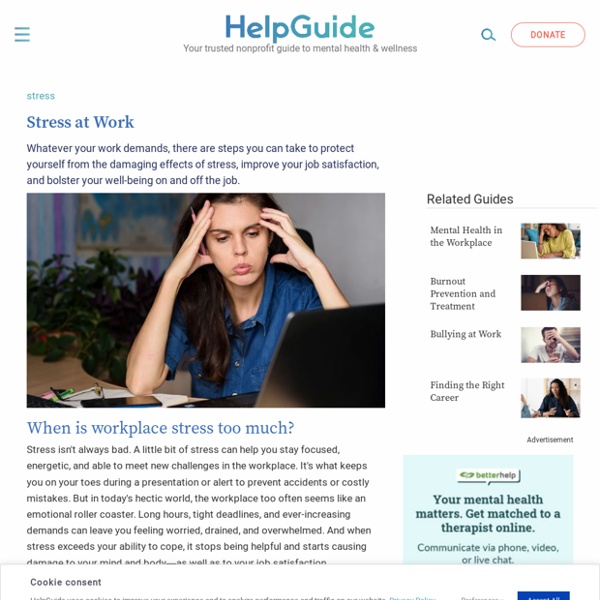The Harmful Effects of Stress At Work
During college, students spend about four years stressing over assignments, deadlines and adapting to new environments. As they prepare to enter the workforce, the pressure to meet academic expectations gets replaced with high career expectations and the stress continues. Although a constant state of stress has become the new norm for many working adults, the physical and mental toll is crippling their chances at success, esteemed workplace and happiness experts Annie McKee and Emma Seppälä argue in their research.
Best and Worst Ways to Cope With Stress
Worst: Eat your feelings Like alcohol or drugs, food often becomes a crutch when coping with difficult times. Soothing your pain with high-calorie, high-sugar, or high-fat comfort foods feels good at first, but it can quickly spiral out of control when your mind and body begin to associate negative emotions with eating.
What Is Stress Management?
Ever notice that a good laugh has a way of lightening your burdens? Or maybe you’ve experienced a scenario like one of these. Your day feels completely stressful and overwhelming, but then you coach yourself to step away from the frenzy, collect your thoughts, make a list of what’s going on– prioritizing what’s important.
Coping with stress at work
Everyone who has ever held a job has, at some point, felt the pressure of work-related stress. Any job can have stressful elements, even if you love what you do. In the short-term, you may experience pressure to meet a deadline or to fulfill a challenging obligation. But when work stress becomes chronic, it can be overwhelming — and harmful to both physical and emotional health. Unfortunately, such long-term stress is all too common.
60% of Singaporean staff experience above average stress levels
Are Singaporean employers doing enough when it comes to health and well-being programmes? It seems not. According to new research from Willis Towers Watson, local employers are still missing the mark, with many employees feeling that their needs are not being met.
Understanding Work Stress: Causes & Symptoms
Posted September 4, 2015 | By Tricia Hussung Based on an annual survey from the American Psychological Association (APA), 60 percent of people in the United States consider their job a major source of stress. In fact, job stress ranked higher than the economy, family responsibilities and even personal health concerns.
16 Simple Ways to Relieve Stress and Anxiety
Stress and anxiety are common experiences for most people. In fact, 70% of adults in the US say they feel stress or anxiety daily. Here are 16 simple ways to relieve stress and anxiety.
Management Tips - The American Institute of Stress
“Stress, in addition to being itself, was also the cause of itself, and the result of itself.” – Hans Selye Just as stress is different for each of us there is no stress reduction strategy that is a panacea. Jogging and other aerobic exercises, different types of meditation, prayer, yoga and tai chi are great for many people but when arbitrarily imposed on others, prove dull, boring and stressful. There is certainly no shortage of stress relievers and in addition to the above, various progressive muscular relaxation exercises, autogenic training, deep breathing, massage therapies, visual imagery and self hypnosis practices are popular.
Burnout likely a common problem here, Singaporeans among most stressed at work globally
SINGAPORE - When Ms Le Giang, 37, started a business selling Vietnamese street food in a kopitiam here nearly two years ago, she looked forward to being her own boss. The degree holder, who was previously a regional sales manager for a multinational firm, has since realised being her own boss is far from rosy. "It's extremely hard running it alone," she said. Some days, she relies on cups of coffee and cans of energy drink Red Bull to keep going. She has had to close the stall on a few occasions because she was too sick to work.
Being Qualified Isn’t Good Enough In Today’s Job Market
Being qualified isn’t good enough anymore. This is a tough thing for most candidates to swallow. It’s tough because we’ve been taught to present our qualifications when we try to sell ourselves for a job … but it’s just not enough anymore. … It’s not enough because there are many qualified candidates. This is really difficult for many executive job seekers, because we’ve been taught to be proud of our qualifications. We wear our qualifications as a badge of honor.



